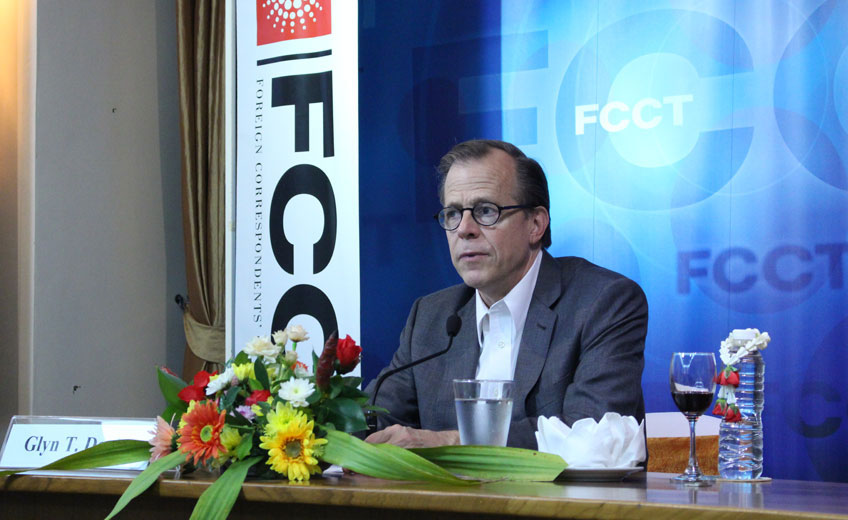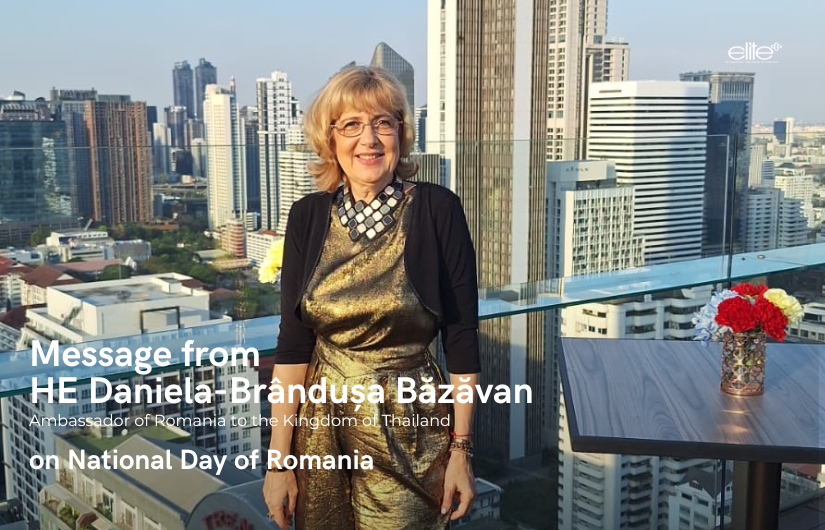Having spent only 12 weeks in the country, no one expected Glyn Davies, the new US ambassador, to speak Thai. But the 58-year-old pulled off a charming “Phom rak pasa thai tae pasa thai mai rak phom” (I love Thai but the language doesn’t love me back). The diplomat won over many attendees at “An Evening with GT Davies, new US ambassador to Thailand” at the Foreign Correspondents’ Club of Thailand in late November.
US diplomats have been perceived as arrogant and finger-wagging in recent years. Kristie Kenny, Ambassador Davies’ predecessor, was heavily criticized for appearing to favour one political camp during Thailand’s political troubles.
Once appointed, Ambassador Davies was expected to play the role of the “ugly American”. His CV suggested him to be hawkish while working on nuclear issues at NATO and more recently as a special representative to the secretary of state for North Korea policy – a background Western journalists in Bangkok joked would be good preparation for dealing with Thailand’s junta.
Ambassador Davies, however, sees few parallels with his latest post. “My background in North Korea has nothing to do with Thailand,” he said. He is, however, aware of the complex and sensitive situation in the Kingdom. British ambassador Mark Kent was recently criticized for expressing support for student activists. Last month right-wing protesters gathered in front of the US Embassy after Ambassador Davies criticized the imposition of jail terms for lese majeste suspects.
The ambassador clarified the lese majeste’s issue. “Americans deeply respect and admire King Bhumibhol. I often say that we claim a little bit of the King as a native son of the US, the only modern monarch born on American soil, and I bet you know all of that. We think he has done many wonderful things, not only for Thailand but also for the US. That said, we believe no one should be jailed for peacefully expressing their views.”
Time will tell whether he can strengthen ties frayed during the term of his predecessor, with the junta now building closer ties with China. The Cobra Gold military exercise, held in Thailand since the 1980s, was put on hold as the US congress would not fund the Asia-Pacific military drills with a non-elected government.
Ambassador Davies said Cobra Gold operations would resume next year after elections. But will the exercise be as meaningful? Thailand and China have also been discussing joint military drills. The ambassador insists the US does not think it is going to lose Thailand to China, recounting the origin of relations between the US and Siam, which started in the early 1800s during the time of President James Monroe and King Rama III.
“I think it is overly simplistic to look at this as a game between China and the US and in which camp Thailand is going to be,” he said. “Thailand is not going to be in anybody’s camp. The Kingdom has always maintained its independence. We are all for a healthy relationship between Thailand and her neighbours, and it is healthy for Thailand to have a good relationship with China. We are assured of working side by side with Thailand because this country has been a long-time ally and our relationship started almost two centuries ago when it took more than a year and a half to get a message across the ocean from Bangkok to Washington, DC.”
The ambassador emphasizes the history of bilateral relations in order to boost present and future ties. “Our relations began not as a fruit of conquest in a colonial war, or geopolitics. It began because the King of Siam and President Monroe saw a partner with whom they could find mutual benefit, and they saw in each other people, citizens who value independence and freedom. That essence is not going away.
“Thailand is fiercely independent in the sense of a free country. The country has always maintained that independence, free from colonial influences and outside influences, and that is good because we want Thailand to be a strong and independent leader in ASEAN.
“I am not sent here to tread softly in order not to lose Thailand to China, because there is nothing about Thailand to lose. Thailand is going through a period of internal retrospection. Politically it is no secret, and even Prime Minister Prayut Chan-o-cha says Thailand is working to return to democracy and Thailand needs to do that by itself.”
“I understand the Thai style of democracy as well. But democracy has universal principles. Read the United Nation’s tenets and you will find key tenets of democracy from the right of self-determination, rights of people to choose their own leaders, rights for freedom of speech, and so on. These are universal values, not American values.”
After rubbing shoulders with Thailand’s movers and shakers and offering his views, he plans to explore the country and study the difficult but beautiful Thai language.
“I ask myself literally every day, ‘How do I act now? How do I say this? How do I navigate this very complex situation and not come across as somebody wagging a finger?’”
Welcome to Bangkok, Ambassador Davies.




























































































































































































































































































































































































































































































































































































































































































































































































































































































































